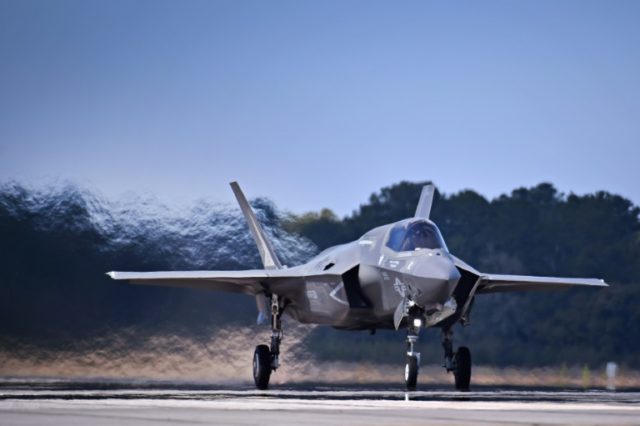The United States suspended the delivery of F-35 warplane-related equipment to fellow NATO member Turkey until Ankara abandons its scheduled purchase of the Russian S-400 missile system, the Pentagon revealed this week.
“We have . . . been clear that acquisition of the [Russian] S-400 is not compatible with the F-35,” Lt. Col. Mike Andrews, a Department of Defense (DOD) spokesman declared in a statement issued Monday, according to the Washington Post. “We very much regret the current situation . . . but the DOD is taking prudent steps to protect the shared investments made in our critical technology.”
“The United States has been clear that Turkey’s acquisition of the S-400 is unacceptable,” Charles E. Summers Jr., another Pentagon spokesman, added in a separate statement, NBC News reports. “Should Turkey procure the S-400, their continued participation in the F-35 program is at risk.”
NBC News learned from an unnamed U.S. Department of State spokesperson that the ramifications of Ankara’s purchase might end up impacting the “potential future arms transfers” to Turkey from the United States.
Despite repeated warnings and ultimatums from U.S. President Donald Trump’s administration that the United States would suspend the delivery of the F-35s if Ankara purchases the Russian system, Turkish Foreign Minister Mevlut Cavusoglu proclaimed after a meeting with his Russian counterpart, Sergei Lavrov, last Friday that “this agreement is a done deal.”
The deal would make Turkey the first NATO member to purchase the S-400 from Russia. Ankara has said Russia would begin the delivery of the $2.5 billion S-400 system this year.
According to media reports, the Pentagon suspended all “deliveries and activities” linked to Turkey’s purchase of 100 of F-35 warplanes as a result.
U.S. officials have already approved the delivery of two of the fighter jets under the agreement, but the two warplanes “remained in the United States while Turkish pilots are being trained,” the Post notes, adding:
Turkey is also one of the co-producers of the $85 million jet, responsible for the manufacture of key components of the fuselage and cockpit.
Last year, when U.S. lawmakers first threatened to block Turkey’s participation in the F-35 program, then-Defense Secretary Jim Mattis objected, saying it could delay production lines by up to two years.
Monday’s statement, however, indicated the Defense Department was prepared to take that step, saying that it was developing “secondary sources of supply for Turkish-produced parts.”
Congress officially ordered a delay in F-35-linked deliveries to Turkey last year.
On Monday, U.S. military officials made good on their pledge to suspend Turkey’s participation in the F-35 Joint Strike Fighter jet program if Ankara moves ahead with the purchase of the S-400 missile system.
Arguing that the Kremlin’s surface-to-air missile defense would be present a threat to the F-35, and is incompatible with other NATO systems last month, Gen. Curtis Scaparrotti, the head of U.S. European Command (EUCOM) and serves as NATO’s supreme allied commander in Europe, warned Turkey against buying the Russian system, arguing that the move will ultimately threaten the alliance’s security.
Echoing other U.S. and NATO officials, the top American commander urged Turkey to reconsider its plan to purchase the S-400 system from the Kremlin or “forfeit” future sales of American military aircraft and systems.
U.S. Vice President Mike Pence also declared on February 16 that the Trump administration has “made it clear that we will not stand idly by while NATO allies purchase weapons from our adversaries.”
Pentagon officials offered the $3.5 billion Patriot missile defense system to Turkey in December of last year. However, Turkey refused, “saying that it wanted better terms for the purchase, including technology transfers and a co-production agreement as it has tried to expand its own defense manufacturing industry,” the Post reports.
In a rare show of bipartisanship, senators from both parties introduced legislation barring the transfer of any F-35s to Turkey.
The proposal argues that Turkey’s purchase of the Russian missile system not only risks the security of NATO members, it also violates the 2017 law threatening sanctions for any purchase of sophisticated Russian technology — the Countering Russian Influence in Europe and Eurasia Act of 2017.
Russia’s S-400 is considered one of the most advanced and feared air-defense systems in the globe.
U.S. support for anti-Islamic State (ISIS/ISIL) Kurds in Syria considered to be terrorists by Ankara has pushed pro-opposition Turkey closer to Syrian dictator Bashar al-Assad’s ally Russia despite being on opposite sides of the conflict.
The United States has defended its support for the Kurds, arguing that they played a significant role in decimating the so-called ISIS caliphate.
“As Russia sought to expand its own defense industry as a direct competitor to the United States, it offered the S-400 system on terms that Turkey considered both economically and politically attractive,” WaPo points out.

COMMENTS
Please let us know if you're having issues with commenting.